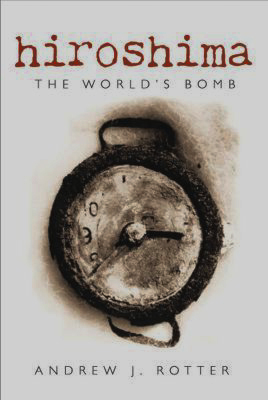

| HIROSHIMA The World's Bomb Andrew J. Rotter Oxford: Oxford University Press, 2008 |
Rating: 5.0 High |
|||
| ISBN-13 978-0-19-280437-2 | ||||
| ISBN-10 0-19-280437-5 | 371p. | HC | $29.95 | |
It is a measure of the gravity of its import that the decision to bomb Hiroshima and Nagasaki with atomic weapons remains controversial. Was it necessary to shorten World War II and thus save lives on both sides? Or was it a barbarity impelled by militarism and bureaucratic inertia, needless because Japan was already on the point of surrender?
I doubt these questions will ever be definitively resolved. There is evidence for both points of view, as Andrew Rotter shows in this well-researched account. Or it might be more accurate to say that the decision was both necessary and barbaric. War is often like that. The broad outlines of Japanese plans for defense of the home islands were known to the Allies, and Rotter describes them here. They almost certainly would have cost far more American lives than the bloody struggle to take Iwo Jima, for example. And many Japanese, both soldiers and civilians, would have died as well in the course of the invasion.
On the other hand, it is not out of the question that Japan's high command might have capitulated if Truman had bent on the one condition they held most important: preservation of Emperor Hirohito's status. But there is the Russian factor.
Two sides are clearly delineated in the long history of atomic weapons: those who, Like Einstein, saw them as a fundamentally new and perilous force that would demand new standards of international behavior;1 and those — most but not all military men — who treated them as just a bigger weapon, to be used to the full extent of applicability. James F. Byrnes, Truman's secretary of state, was one of the latter. So was Truman, as far as can be told.2 So was Edward Teller, known as the father of the hydrogen bomb (which he called "the Super.") The great majority of scientists, however, favored international control of nuclear technology. Many Manhattan Project scientists felt remorse for their part in bringing the Bomb to life, and afterward dedicated themselves to arms-control efforts.
Einstein and like-minded thinkers were right. The introduction of atomic power into the world was a historical divide. In the brutal aftermath of WW II, more far-sighted choices might have placed it under independent control, giving us a far different world. But parochialism ruled the day,3 and still does. Nuclear power, therefore, has a very spotty record. Yet Hiroshima today, Rotter tells us hopefully, is a thriving city where smiling young women remind visitors to its Peace Memorial Museum at ground zero about the zoo, the botanical gardens, and many other local destinations they might enjoy.
Mistakes can be corrected.
Rotter explores the prehistory of nuclear warfare, comparing the use of atom bombs on cities to poison gas, used extensively in World War I, and to the firebombing raids done extensively during WWII — most notably at Dresden and Tokyo. He shows us that there was ample precedent for killing large numbers of civilians, on both sides. Heedless barbarity in battle did not enter modern military history with Fat Man and Little Boy. Also, given the march of scientific progress, the atom bomb would have been achieved within a few years of its actual development in any case. Britain made the initial breakthroughs, followed closely by Germany. Japan had its own A-bomb program, but it was a tiny effort. Russia was also working on the technology, but like Germany stumbled in the path due to erratic leadership and bureaucratic infighting. A case, though not an ironclad one, can be made that it is because Hiroshima and Nagasaki were bombed that nuclear weapons have never since been used in anger.
Perhaps the greatest lesson to be drawn from Hiroshima is that the nuclear genie still poses a looming threat, although of a vastly different character than the "global thermonuclear war" portended by the Cold War years:
"More than sixty years later, the Cold War is past, the danger of a nation-to-nation exchange of nuclear bombs or warheads seemingly diminished. Yet in an age of stateless terrorism and great-power arrogance, where international norms and institutions appear helpless to prevent violence and nuclear materials go ominously missing, where there are no longer one or two nuclear nations but perhaps ten, we may wonder whether the world is safer from nuclear holocaust than it was in the bewildering days following that clear August morning in 1945." – Page 6 |
Andrew J. Rotter is the Charles A. Dana Professor of History at Colgate University. He was well-suited to the task of writing Hiroshima, for he is extraordinarily well-read4 and has written extensively on twentieth-century relations between the U.S. and Asia. This excellent book is complemented by 18 black-and-white photographs, extensive endnotes, a bibliographical essay, and a thorough index. (A good many of the endnotes cite three or even four sources for one fact or quotation.) There are three passages that seemed unclear, and a few cases where Rotter didn't get the technology right. And there are some grammatical errors, but relatively few for a work of this scope. Despite these minor defects, it is one of the best accounts of those turbulent days at the close of World War II, a useful summary of the subsequent growth of the "nuclear club", and a keeper for any history buff.

 To contact Chris Winter, send email to this address.
To contact Chris Winter, send email to this address.